Dog Births on the Way – A Care Guide
You have likely cared for your dog for awhile before she became a pregnant dog, but have you given some thought about the special care she’ll need during her pregnancy? This article is the second in a series about dog pregnancy symptoms and care. The first article focused on figuring out whether or not your dog is pregnant. This one will tell you how to care for your pregnant dog.
Read Dog Pregnancy Symptoms Part 1 here
A dog pregnancy lasts anywhere from 54 – 72 days, but “normal” is 62 days. During this time, your main responsibility is to keep your pregnant dog comfortable and make sure she is eating enough to provide adequate nutrition to her growing puppies.
One of the most important differences between dog pregnancy and human pregnancy is in the need for vitamin supplements. A dog should never be given vitamin supplements during the first month of her pregnancy. A dog who receives supplements will not be able to extract calcium properly from her bones after birth. As the calcium level in the blood drops, the dog may develop muscle weakness or even seizures. In addition, too much vitamins A and D can cause birth defects in the newborn puppies.
Feeding a Pregnant Dog

When your dog starts exhibiting pregnant dog symptoms, you will continue feeding her regular food for the first month after breeding. However, when she gets into the last half of her pregnancy, you will begin feeding puppy food to provide more calories in her diet. You will want to find a high quality food that provides adequate nutrition to both the pregnant dog and her puppies. If any nutrient is in short supply, the small amount available will go to the puppies, not to the mama dog. This is Mother Nature’s way of providing for survival of the species.
During week five of your dog’s pregnancy, you will increase her feeding by about 25%, and your veterinarian may prescribe a vitamin supplement to make sure all necessary nutrients are being provided. At week six, add another 25%. Your dog may begin to lose interest in food as she becomes more uncomfortable, so you may have to divide her food into smaller feedings, several times a day. At week seven, add another 25%, and at week eight, add another 25%. A sample feeding schedule is shown below, assuming your dog was eating 1 cup of food twice per day before the pregnancy.
| Week(s) | Type of Food | Breakfast | AM Snack | Lunch | PM Snack | Dinner |
| 1 – 4 | Dog | 1 cup | X | X | X | 1 cup |
| 5 | Puppy | 1-1/4 cup | X | X | X | 1-1/4 cup |
| 6 | Puppy | 1 cup | X | 1 cup | X | 1 cup |
| 7 | Puppy | ¾ cup | ¾ cup | 1/2 cup | ¾ cup | ¾ cup |
| 8 | Puppy | 1 cup | ½ cup | 1 cup | ½ cup | 1 cup |
Exercise During Your Dog’s Pregnancy

Throughout the dog pregnancy, it is important that you provide plenty of exercise for your dog. During the first month, take your dog for daily walks, and if you have a place for her to run, that is even better. Exercise will put your dog into top condition for delivering her newborn puppies. By week seven, you will notice that your pregnant dog is beginning to sleep more and may not be as interested in exercise. Try to take her for several short walks each day so all of those muscles you worked so hard to get into shape will stay that way.
Dog Whelping Box
The last thing you will need to do during your dog’s pregnancy is to find a whelping box. Playpens are often used for this purpose, but you can use just about anything that meets the following requirements. It must have sides high enough that a 4 – 6 week old puppy cannot climb out, but low enough that mama can have a break from her pups when she needs one. With a playpen, you would accomplish this by collapsing one side. There should also be a ledge running around the inside of the box, which allows the newborn puppies a place to hide when the mother rolls over in her sleep.

The box or playpen should be set up in a quiet, private place that the dog is familiar with. Set it up about a week before you expect the puppies to be born, so the mama has time to get used to it. The box should be lined with towels, and you will need to have plenty of extra towels on hand. Dog births are no less messy than human births!
You can line the box with newspapers, which the dog may shred as she prepares for giving birth. Alternatively, you might want to line the box with old towels. However, you will have to remove and wash the towels quite often as the puppies will not have the muscles to control their bowels and bladders for the first few weeks.
Be sure to stop back and look for our article on dog birth and our newborn puppy care guide.
Read Part 3 Dog Birth here
Doggies Den: Latest Articles
 Homemade Thanksgiving Treats for Your Dog
Homemade Thanksgiving Treats for Your Dog
NUTRITION We all want to include our dogs in our holiday celebrations, but hopefully, you're aware that sharing table scraps with your dog isn't always the best idea.
 Keeping Your Dog Safe during the Summer Months
Keeping Your Dog Safe during the Summer Months
HEALTH Summer is coming on fast, so it’s time to plan how you will keep your dog safe and healthy through the lazy, carefree, warm days.
 Vaccination Time Again-Keeping Your Puppy Healthy
Vaccination Time Again-Keeping Your Puppy Healthy
DOG HEALTH So you have your new puppy picked out. There are quite a few shots, treatments and examinations that will keep the newest member of your family healthy.
 Canine Thanksgiving Feast
Canine Thanksgiving Feast
NUTRITION With the wide variety of food at Thanksgiving dinner, chances are you'll want to give your dog something special, too. If you're contemplating what to feed your dog for the holiday, here is a guide to a great Canine Thanksgiving Feast.
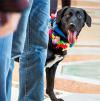 Dog Walking Tips Every Owner Should Know
Dog Walking Tips Every Owner Should Know
DOG FUN Walking your dog is not only crucial to keeping him healthy and happy, it strengthens the bond between your canine friend and his caregiver. There are a lot of obstacles out there. Don’t forget these simple tips to keep your walk fun and safe in the outside world.
 The Benefits of Physiotherapy for your Dog
The Benefits of Physiotherapy for your Dog
HEALTH The same techniques that physiotherapists use to treat a variety of injuries and conditions in humans have been adapted to suit animals with great success. Family pets, show dogs, and working dogs can all benefit greatly from physiotherapy. Dogs whose activities involve a lot of agility are especially susceptible to the types of problems that physiotherapy can address.
 The Decision- Adding a Dog to Your Family
The Decision- Adding a Dog to Your Family
FIRST TIME OWNERSBringing a dog into your family is a decision where many people don’t realize it’s magnitude until after they have the dog. There are a number of things that you need to research before you decide to purchase a dog, and it starts right in your own home.
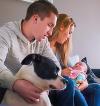 Bringing Your Dog Into Your New Baby's Life
Bringing Your Dog Into Your New Baby's Life
HEALTH Many believe that a dog and a new baby cannot happily coexist, so therefore the dog has to go. This is not necessarily the case.  A new baby does not mean you have to abandon your dog.

Doggies Den:
Most Popular Articles
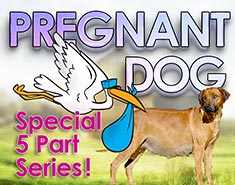
Dog Pregnancy Symptoms
HEALTHIf you suspect your dog might be pregnant, check out part one in this series on pregnant dogs, where we cover pregnant dog symptoms.
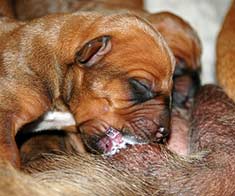
Dog Birth
HEALTHIn the third article of our dog pregnancy series, we look at the wonderful, but messy, process of bringing newborn puppies into the world.
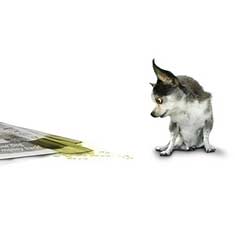
Indoor Dog Potties
DOG PRODUCTSIt's been a long day at work. You were so busy, you didn't even take time to eat a sandwich, let alone run home to let your dog out. You're on your way home, knowing the poor dog is crossing his or her legs by now, when your car breaks down, delaying you even further. Can't somebody make this easier?
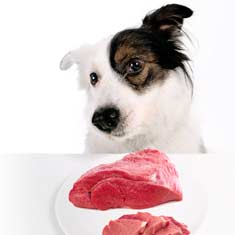
Your Dog’s Digestive System
PHYSIOLOGYEver wonder why your dog eats so fast? Or why he eats gross things? Or why he gets sick to his stomach? Or why his waste stinks so bad? Some of these things are normal, some are not.

Canine Respiratory System
BREATHINGThe basic function of your dog's respiratory system is to bring oxygen in to and remove carbon dioxide from the body. Knowing the symptoms of respiratory diseases can help you help your stay healthy.
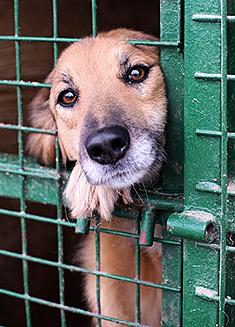
Shelter Dog Adoption Tips for Success
ADOPTION Are you intimidated by the prospect of "rescuing" a dog from a shelter? One reason that you may be wary of adopting a dog from a shelter is not knowing how to choose. Adopting a dog from a shelter can be a rewarding process, if you're prepared to do a reasonable amount of research.
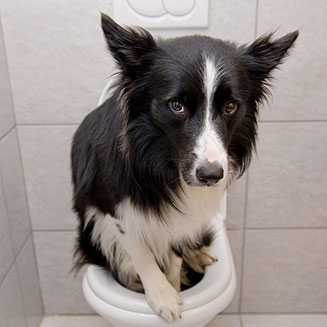
Canine Urinary Tract Infections
SYMPTOMS AND TREATMENTDoes your dog seem to be having trouble relieving his or her bladder? Learn how to recognize the signs of urinary tract infections and how to treat them before they spread.
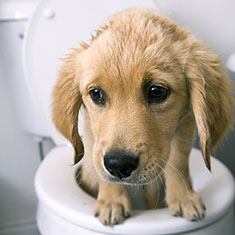
What to do for Dog Diarrhea
SYMPTOMS AND REMEDIESIf you have dogs in your house for any length of time, you have likely experienced at least one bout of dog diarrhea. Beyond the pain in the tuckus involved in cleaning up the mess, you should know what causes diarrhea, and when it's important to see the vet.

What to do for a Dog Bite
DOG BEHAVIOR Getting bitten by a dog can be scary, and you may be tempted to run around in circles for a while, trying to figure out what to do. Here's our guide to help you manage the situation.
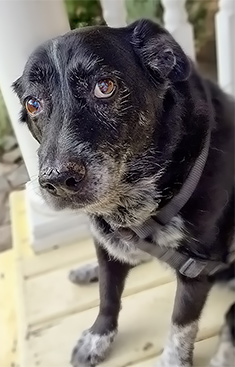
Top Ten Tips for Living with a Senior Dog
DOG HEALTH Bringing home a new puppy is so exciting, but it doesn’t take all that long for your exuberant puppy to grow into a senior dog who may have special needs. Here are the doggies.com top ten tips for taking care of your companion who has been with you through so much.
